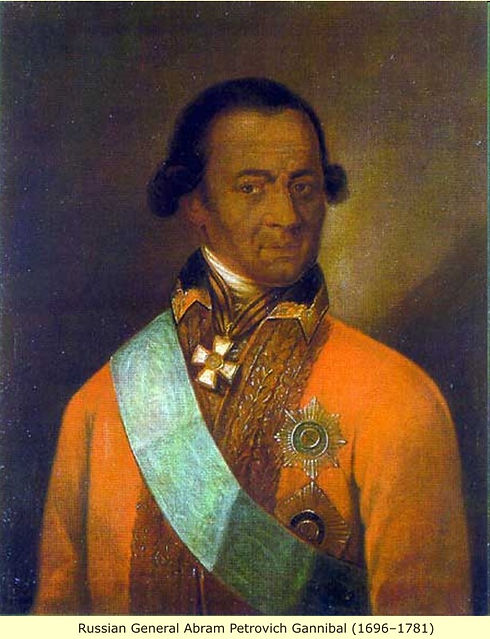
ABRAM PETROVICH HANNIBAL
+ Descendants
Abram Petrovich Gannibal, also Hannibal or Ganibal or Ibrahim Hannibal or Abram Petrov, was an Afro-Russian nobleman, military engineer and general. Kidnapped as a child and presented as a gift to Peter the Great. He was raised in the Emperor's household and eventually rose to become a prominent member of the imperial court in the reign of Peter's daughter, Elizabeth. He is perhaps best known today as the great-grandfather of the author and poet Alexander Pushkin.
Some British aristocrats descend from Gannibal, including Natalia Grosvenor, Duchess of Westminster and her sister, Alexandra Hamilton, Duchess of Abercorn. George Mountbatten, 4th Marquess of Milford Haven, a cousin of Queen Elizabeth II, is also a direct descendant, as the grandson of Nadejda Mountbatten, Marchioness of Milford Haven.

Hannibal
Абра́м Петро́вич Ганниба́л
c. 1696 - May 14, 1781
At the age of seven (c. 1703), Gannibal was stolen and taken to the court of the Ottoman Sultan at Constantinople. Based on the year, the Sultan was either Mustafa II (reigned 1695–1703) or Ahmed III (reigned 1703–1730). The German biography of Gannibal, compiled anonymously from his own words, explains that "the children of the noble families were taken to the ruler of all the Muslims, the Turkish sultan, as hostages", to be killed or sold into slavery if their fathers misbehaved.
In 1704, after one year in Constantinople, Gannibal was ransomed and brought to the Russian capital by the deputy of the Russian ambassador Sava Vladislavich-Raguzinsky, on orders of his superiors (one of whom was Pyotr Andreyevich Tolstoy, great-grandfather of the celebrated writer Leo Tolstoy), and was presented to Peter the Great.
The Emperor is noted to have taken a liking to young Abram’s intelligence and potential for military service, and brought the child into his home. Abram had a close relationship with Peter, and starting at a young age Abram would travel alongside Peter during his military campaigns. During these military journeys, Abram served as his godfather’s valet. Abram valued his relationship with his godfather, as well as Peter’s daughter (Elizabeth), and was loyal to them as if they were family.
Ivan Hannibal
Иван Абрамович Ганнибал
June 5, 1735 – October 12, 1801
Ivan Abramovich Gannibal was an eminent Russian military leader. He was the son of military commander, general and engineer Abram Petrovich Gannibal, as well as the great-uncle of Russia's most famous poet, Alexander Pushkin.
Gannibal led a detachment of the Imperial Black Sea Fleet, which besieged and captured the Turkish fortress of Navarin during the Russo-Turkish War (1768–1774), and took part in the founding of the city of Kherson. Gannibal's ultimate military rank was Général en Chef.
Gannibal was the oldest of 10 children born to Abram Gannibal and his Swedish-German wife Christina Regina Siöberg in Karjaküla, Reval Governorate, Russian Empire (presently in Estonia). Gannibal was destined for a military career from an early age, entering the Naval Artillery School in the imperial capital at the age of 9. He would eventually graduate from the Naval Academy and join the Imperial Russian Navy as an officer.


Alexander Pushkin
Алекса́ндр Серге́евич Пу́шкин
June 6, 1799 - February 10, 1837
Alexander Sergeyevich Pushkin was a Russian poet, playwright, and novelist of the Romantic era. He is considered by many to be the greatest Russian poet and the founder of modern Russian literature.
Pushkin was born into Russian nobility in Moscow. His father, Sergey Lvovich Pushkin, belonged to Pushkin noble families. His maternal great-grandfather was Central-African-born general Abram Petrovich Gannibal. He published his first poem at the age of 15, and was widely recognized by the literary establishment by the time of his graduation from the Tsarskoye Selo Lyceum.
Upon graduation from the Lycée, Pushkin recited his controversial poem "Ode to Liberty", one of several that led to his exile by Tsar Alexander I of Russia. While under the strict surveillance of the Tsar's political police and unable to publish, Pushkin wrote his most famous play, the drama Boris Godunov. His novel in verse, Eugene Onegin, was serialized between 1825 and 1832.
Pushkin was fatally wounded in a duel with his wife’s alleged lover, her brother-in-law, Georges-Charles de Heeckeren d'Anthès, also known as Dantes-Gekkern, a French officer serving with the Chevalier Guard Regiment.